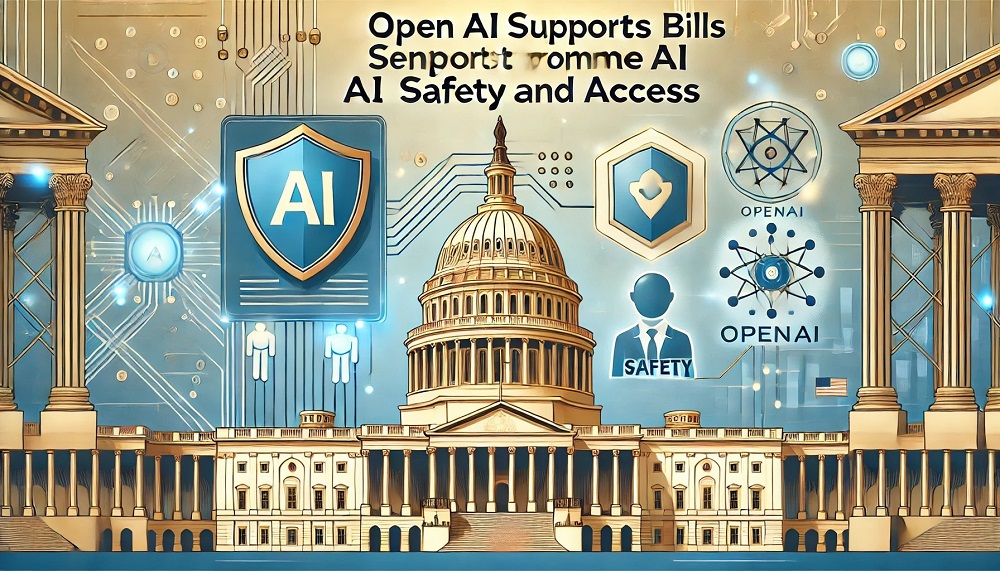The push for responsible artificial intelligence (AI) use is gaining traction as OpenAI backs the US Senate move to enhance AI safety and accessibility. The AI bills, which include the NSF AI Education Act, the CREATE AI Act, and the Future of AI Innovation Act, aim to cater to different scopes of artificial intelligence.
OpenAI’s Legislative Support for AI Regulation
OpenAI’s Vice President of Global Affairs, Anna Makanju, recently posted on LinkedIn to express the company’s support for the Future of AI Innovation Act. The goal of this legislation is to get congressional support for the US AI Safety Institute, a group dedicated to developing best practices for the secure application of cutting-edge AI systems.
The Act’s support demonstrates OpenAI’s dedication to encouraging the ethical development of AI technologies and making sure their use places a high priority on ethical and safety issues.
AI Education and Democratization
The CREATE AI Act, which attempts to formalize a campaign to democratize access to AI research resources, is also supported by the organization. This project is essential for encouraging creativity in all areas and ensuring that more researchers and developers have access to the latest developments in AI technology.
By supporting this legislation, OpenAI draws attention to the value of inclusivity in AI research and development, enabling smaller organizations and individuals to make contributions to the field. Furthermore, OpenAI is supporting the NSF AI Education Act.
The Act aims to train the next generation of AI experts by fortifying the educational framework and guaranteeing that they have the abilities required to navigate and influence the field of AI in the future. This program aligns with OpenAI’s goal of having a workforce capable of developing and implementing AI technologies safely and efficiently.
Global Views
Moreover, authorities in the United Kingdom have spoken about the need for strict AI controls, drawing comparisons between the significance of these measures and those about nuclear power and medicine. The call to action highlights the possible dangers of unchecked AI advancement.
Consequently, the European Union took the initiative by introducing the Artificial Intelligence Act, which would be in force on August 1. This landmark legislation represents a key milestone in the regulation of AI inside the European Union.
The AI Act will be implemented gradually over several years to give organizations time to adjust and meet the new requirements. Similar to how the EU implemented the Markets in Crypto-Assets Regulation, this phased implementation offers enterprises a well-defined path to comply with the new standards.
EU AI Act Implementation
The “Prohibitions of Certain AI Systems,” which are scheduled to go into effect in February 2025, will be the first major milestone in the implementation of the AI Act. These guidelines will forbid AI programs that take advantage of personal weaknesses, steal facial photos without authorization, or build databases of recognized faces without permission.
The goals of the Act are to protect privacy and prevent the improper use of AI technologies. There will be new specifications for general-purpose AI models around August 2025.
These systems, which are intended to perform a variety of functions, will be governed by new laws to guarantee accountability and openness. Particular regulations for high-risk AI (HRAI) systems—which present particular threats to transparency—will take effect by August 2026.
For instance, by August 2027, HRAI systems used in toys and other products covered by EU health and safety regulations must be compliant. Regardless of design changes, public entities utilizing HRAI systems must comply with the standards by August 2030.
Enforcing Compliance
The EU will also create national regulatory bodies to monitor compliance in each of the 27 member states, ensuring that the AI Act is fully enforced. These agencies will demand paperwork, carry out audits, and impose corrective measures.
Furthermore, enterprises operating within the European Union will be subject to rigorous compliance requirements, encompassing risk mitigation, data governance, information transparency, human supervision, and post-purchase monitoring. Therefore, industry experts advise businesses to invest in complete data governance frameworks, develop strong documentation procedures, and begin extensive audits of their AI systems.
